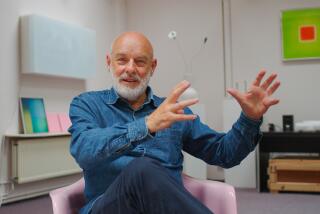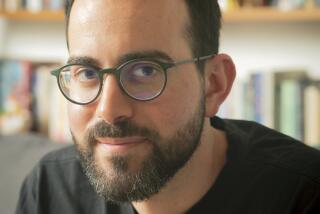Physicist Lived for Beethoven, Quantum Mechanics
- Share via
Some people have such a presence that their sudden absence leaves a palpable hole in the universe.
So it is with the death last week of Viki Weisskopf of MIT--not merely a great physicist, but a man colleagues referred to as everything from “the conscience of the physics community” to “the ultimate civilized man.”
Viki played chamber music with Einstein (“I’ve played with better,” he said, “but he was very enthusiastic.”) He taught quantum mechanics to Pope John Paul II, and loved the idea that a Viennese Jew would advise the pontiff. (They worked together on disarmament issues.) At Europe’s CERN particle accelerator, where he brought about the first truly international physics lab, he was known as “the Grey Eminence.”
To a novice stumbling through the confusing maze of modern physics, he was a steady comfort, an eager guide. I was introduced to Victor Weisskopf through his book “Knowledge and Wonder,” the only book other than “The Exorcist” that I ever stayed up all night to read. Early on, I borrowed his example of how an extra lousy little electron changes the nonreactive gas neon into the highly reactive metal sodium. A fact-checker at Discover magazine objected that the example I used wasn’t technically correct because sodium also has an extra proton.
When I asked Viki about it, he said: “You always have to lie a little to tell the truth.” Years later, when I confessed to feeling guilty because I stole so many of his ideas, he said: “The only sin is if you hear a good idea and you don’t steal it.”
Wrong ideas, he often said, were as important in their own ways as right ones. He told me the story of an impatient German tourist who asked why the Austrians bothered to publish train schedules when the trains were never on time. “If we didn’t have timetables,” the conductor answered, “we wouldn’t be able to tell how late we are.”
When I was frustrated trying to understand gravity as the curvature of space-time, Viki told me he often felt the same way. He shared the story of the peasant who asked the engineer how a steam engine works. The engineer gave a detailed explanation, drawing diagrams, showing where the fuel goes in, how heat is transformed into motion and so forth. When the engineer was done, the peasant said he understood perfectly. Just one question, the peasant added: “Where is the horse?”
Viki said that’s how he still felt about Einstein’s theory of gravity. “I understand it perfectly. But I don’t know where the horse is.” He said the theory of relativity should be called the “theory of absolutism,” and helped me see that Einstein’s genius came from his insight into the unvarying nature of fundamental law. “Relativity says that the laws of nature are absolute and do not depend on the motion of the system,” Viki said. “The only things that become relative are old-fashioned concepts like space and time.”
He renamed the notorious “uncertainty principle” the “definiteness principle,” and passionately defended quantum mechanics against charges that it somehow implied nature was not concrete. On the contrary, he explained, quantum mechanics showed why atoms had only a few stable configurations, like musical chords. All the regularities of nature spring from this astonishing fact--the permanence of genes through generations, the sameness of gold atoms everywhere in the cosmos, the fact that the same flowers bloom again every spring.
Above all, he loved the principle of complementarity, developed by his mentor, Niels Bohr, the Danish physicist. Complementary truths are seemingly irreconcilable opposites that are both required for deep understanding. “We cannot at the same time experience the artistic content of a Beethoven sonata and also worry about the neurophysiological processes in our brains,” he said. “But we can shift from one to another.”
He told a story about a conversation that took place between Nobel laureates Felix Bloch and Werner Heisenberg during a walk on the beach. Bloch was expounding to Heisenberg some new theories about the mathematical structure of space. Heisenberg responded: “Space is blue, and birds fly in it.”
Whenever one way of thinking dominated, Viki warned, it spelled disaster for society--whether it was the dominance of religion in the Middle Ages or the dominance of technology today.
He liked to say he lived for Beethoven and quantum mechanics. “What’s beautiful in science is the same thing that’s beautiful in Beethoven,” he once told me. “It connects things that were always in you that were never put together before....There’s a scientific truth and an emotional truth. If you are completely immersed in one, many important aspects of life are missed.”
Luckily for me and everyone who knew him, Viki didn’t miss a thing.
*
K.C. Cole can be reached at kc.cole@latimes.com.






